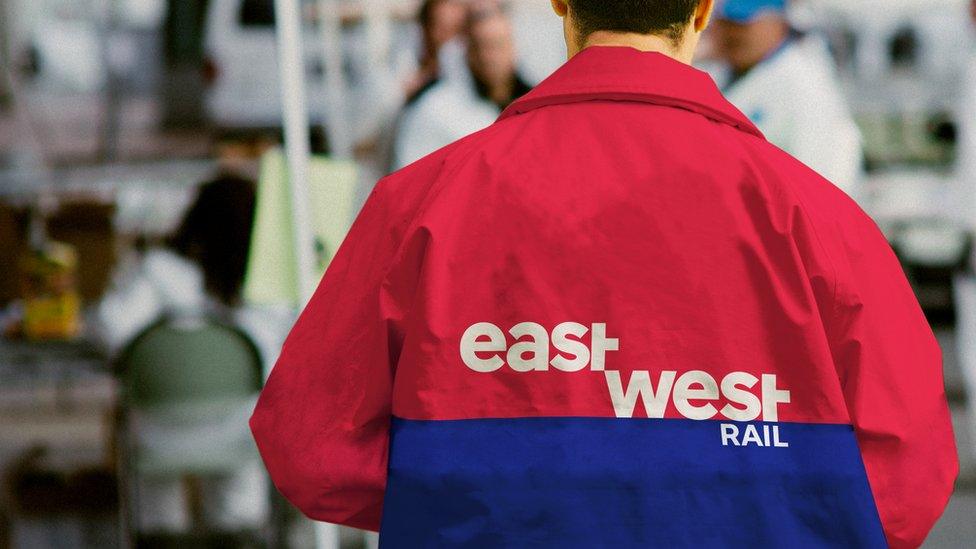Oxford to Cambridge East-West Rail link consultation ends
- Published
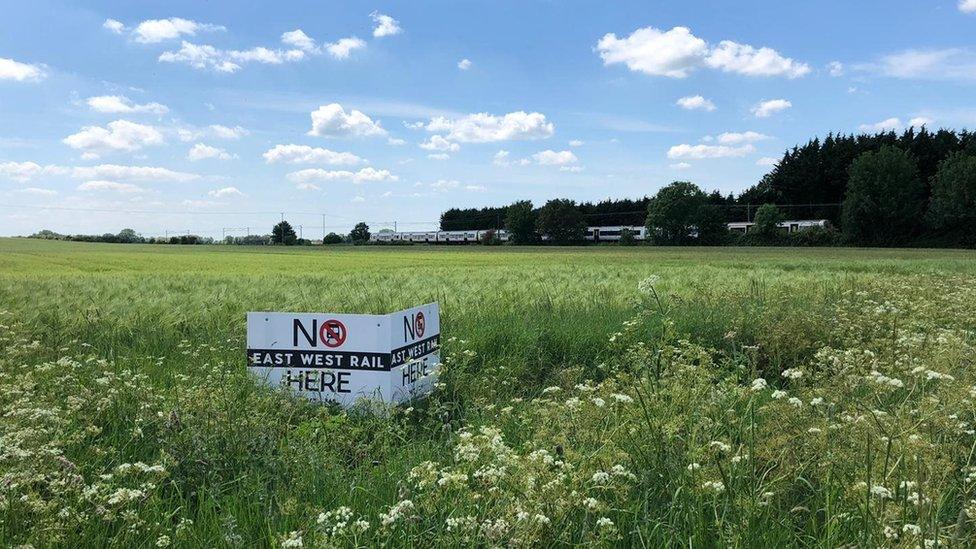
The local campaign group has put signs across the area protesting against the plans, including in Harston near the existing Cambridge-Hitchin-London railway line
Three months of heated public debate comes to a head as the latest consultation for the East-West rail project closes. The £5bn plans are due to connect Oxford and Cambridge via a direct line by the end of the decade. But what do those affected by the current proposals feel?
The new rail link will "connect communities between Oxford, Milton Keynes, Bedford and Cambridge", according to the East West Rail Company, external (EWRC), set up by the Department for Transport in 2018 to help deliver the project.
The preferred route for the Bedford to Cambridge section would involve the construction of a new track using a southern approach into Cambridge.
While the public consultation closes on Wednesday, the exact route has yet to be finalised, with a decision expected by next year.
Development consent is anticipated by 2024 and work could begin the following year.

'It splits the meadows in half'

William and Simon Hays work on the farm in south Cambridgeshire
William Hays has worked on Baggot Hall Farm in the south Cambridgeshire village of Harston for 40 years.
The 59-year-old, who runs the farm with his cousin Robert, takes out a map of the current EWR plans and points out how it will affect them.
"Basically it takes out two houses, a grain store and livestock buildings and splits the land in half on a part of the farm which will then not be a lot of good for arable use," he says.
"It splits the meadows in half where the cattle graze, which will mean the most likely thing is that the cattle will have to go because it won't be viable."
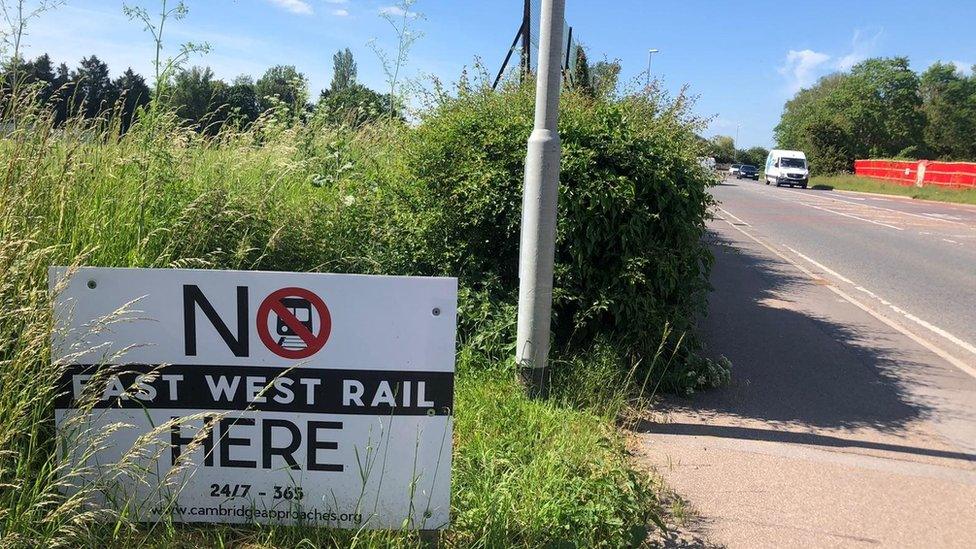
Signs in protest of the plans are dotted around south Cambridgeshire, such as this by the A10 near Hauxton
William says the whole situation is understandably "stressful" given the current question marks around the plans, while Robert's son Simon believes it could well affect his future.
"Before the idea of it coming through here we'd been thinking of how it might pass down to me, but all of a sudden you've got this railway plan," the 27-year-old says.
"Now I'm basically not sure what my future's going to be. We may end up having to basically sell everything up."
William feels it makes more sense for the route to go north into Cambridge, rather than south, to suit the new builds in that part of the county.
EWRC says affected landowners can claim compensation if they meet the correct criteria.
"Our role is to connect the communities the railway will serve, and while the loss of agricultural land as a result of construction is likely to be unavoidable, we will work with farmers to explore how we can mitigate any impacts once a final route alignment has been chosen," it adds.

'There has to be a better way'
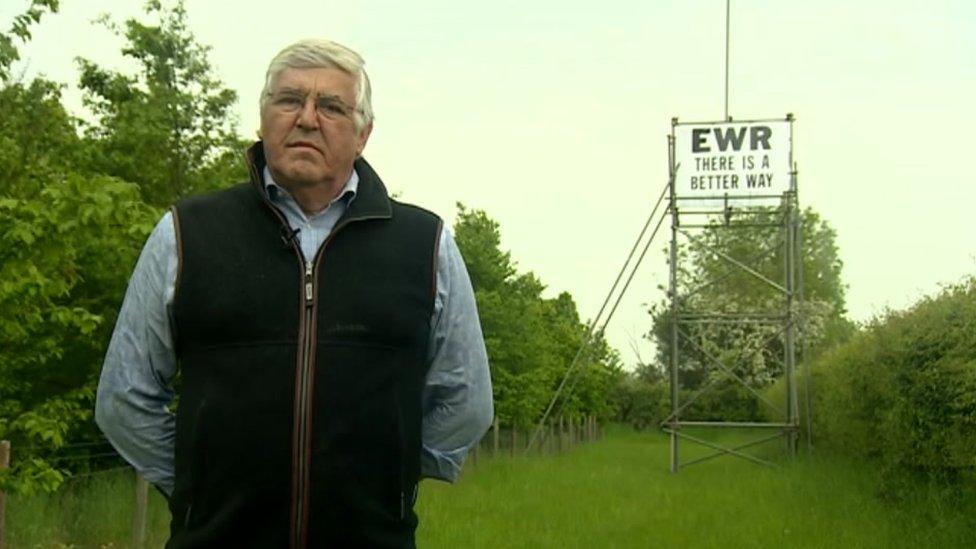
Peter Wedd's scaffolding tower is right by the A10, which runs directly through Harston
Down the road from the farm, Peter Wedd also favours the northern approach.
The 66-year-old says he could lose about two acres of land near his home, used for eventing horses.
He believes even if there is no direct impact on him, he will remain "as vocal as I am now if I thought countryside was being ruined and taken away; not for my generation or the next generation, but forever".
"I can understand, nobody wants it in their back garden, and I can accept that, but there has to be a better way than this," he adds.
About a month ago, he devised the idea of building a tower by the A10, the busy main road running through the village, "to make people aware of what this is exactly going to look like".
In some sections the planned embankment that the railway lines will be on will be as high as 10m (32ft) - the exact height of his scaffolding.
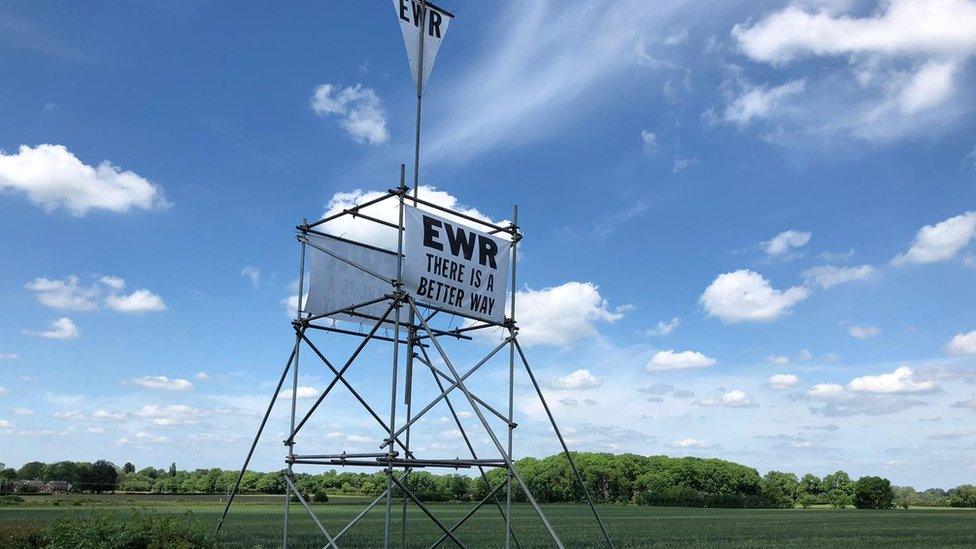
A second tower has been paid for by local residents following Mr Wedd's idea
He said the response from the community has been "amazing" and the residents have shelled out for another tower of their own on the road to nearby Newton.
"I will do anything in my power to make people aware of what is going to happen because this is time-limited," says Mr Wedd.
"Once we do this, the beautiful countryside is gone."
EWRC says "there is still more design work to do to refine" the height of the works and "we will look for possibilities to reduce the height further as part of the engineering design process".
"As we further refine the design for any route alignment that is eventually selected as the preferred one, we'll also be considering other ways in which we can blend these features into the landscape, for example through tree planting."

'Dogmatically ignored'

Dr William Harrold co-founded a grassroots group set up for "ensuring the best route is found for the East-West Rail project"
Mr Wedd and the Hays are not alone in their views about the approach into the university city of Cambridge.
South Cambridgeshire residents have set up a campaign group, Cambridge Approaches, external, which claims that a northern route into Cambridge would, among other arguments, have at least seven times fewer residents living within 200m (656ft) of the line and have less impact on the environment.
"East-West Rail's proposal to construct a Great Wall through south Cambridgeshire is a desecration of the local environment and the lives of local residents in the name of cost reduction and in the face of better alternatives dogmatically ignored or dismissed," says the group's co-founder Dr William Harrold.
Their campaign also states that a northern approach would be a better fit for the growing population in that area, including a major development in Northstowe.
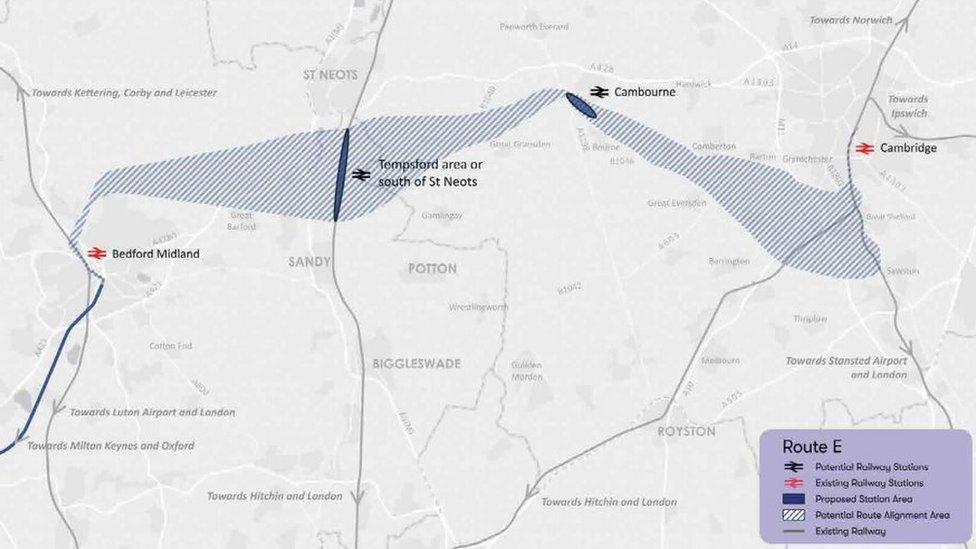
A diagram of the proposed "Route E" between Bedford and Cambridge, chosen after an earlier consultation. The route continues west to Milton Keynes and Oxford
EWRC has previously stated it believed a southern approach into Cambridge "would require the demolition of no more than five homes and businesses". This is far less, it says, than the 39-85 properties that would be at risk if a northern approach was chosen.
It stated that "20% more people live within 200m of the northern approach compared to the southern" and the southern route would mean "fewer flood plains to navigate".

'Essential step'
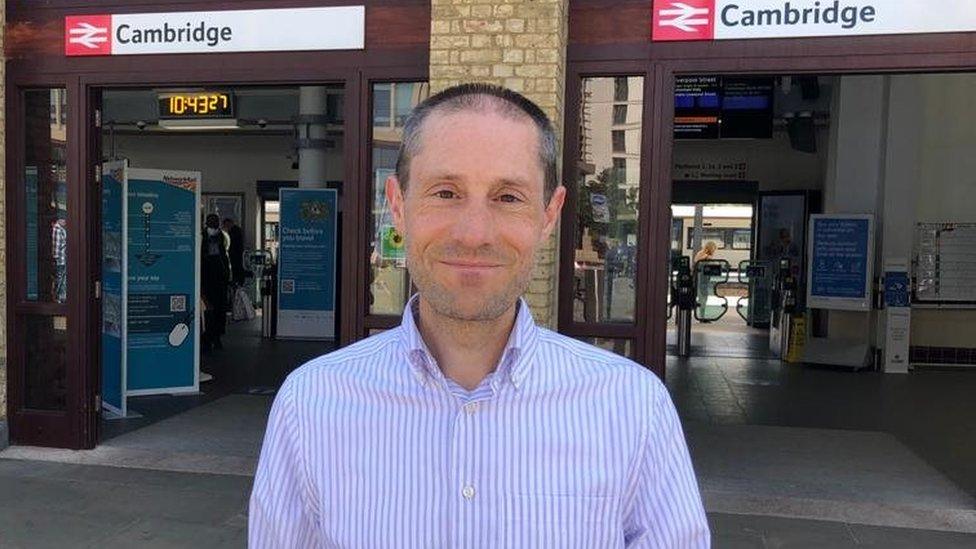
Edward Leigh believes that while finely-balanced, a southern route is preferable
Edward Leigh, from the campaign group Smarter Cambridge Transport, says the proposed new railway line is an "essential step to increasing sustainable transport capacity into Cambridge and its growing employment centres", as well as removing traffic from the busy major roads of the A14 and A428.
His group believes that, while a very finely-balanced decision, "a southern approach is preferable to a northern approach".
However, Mr Leigh has asked for EWRC to re-examine the plans in Harston's neighbouring village of Haslingfield, where he believes a "less-damaging alignment" is possible.

Due to the pandemic, virtual consultation rooms were set up by EWRC
EWRC's current proposals include the possibility of a "temporary solution" of diesel power to get services up and running, something Mr Leigh is firmly against.
"One point on which everyone is agreed is that the line must be fully electrified from the outset," he says.
EWRC says it is considering electrification for when the line is fully open between Oxford and Cambridge.
Simon Blanchflower, chief executive of EWRC, says: "We are delighted that so many people have already taken the opportunity to give their views on our developing plans.
"Getting this feedback is so important - your views will help us make sure we can make the most of this once-in-a-generation opportunity to provide new, reliable, sustainable transport for communities from Oxford to Cambridge."

Find BBC News: East of England on Facebook, external, Instagram, external and Twitter, external. If you have a story suggestion email eastofenglandnews@bbc.co.uk
- Published8 June 2021
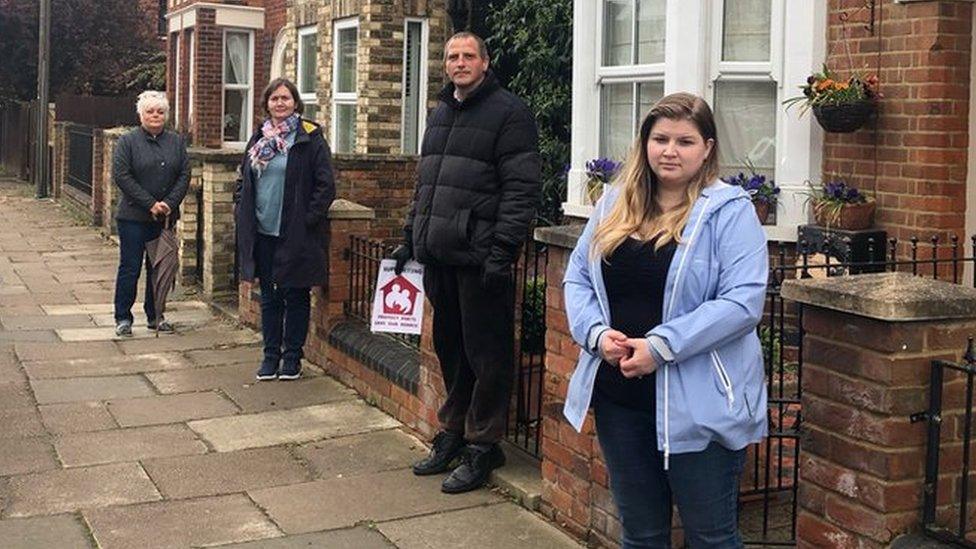
- Published22 May 2021
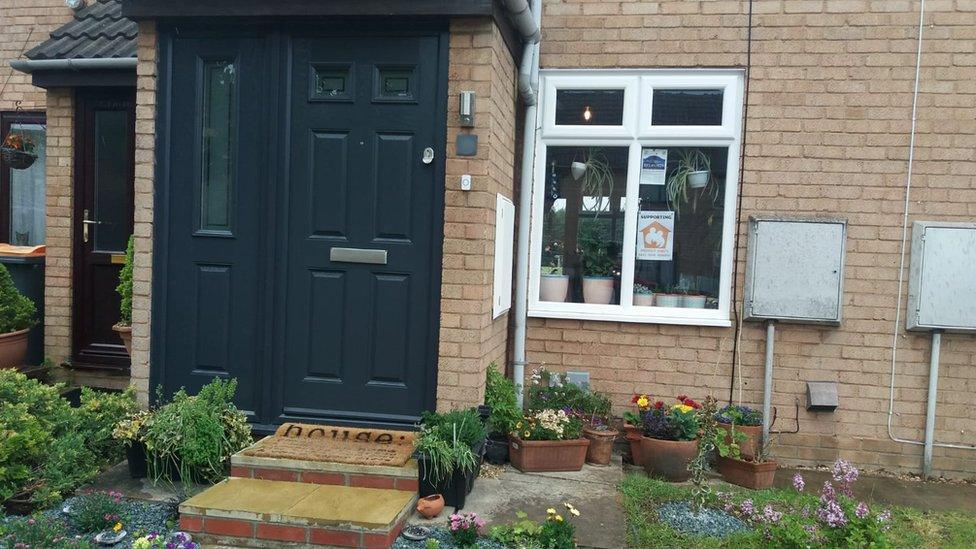
- Published17 May 2021
